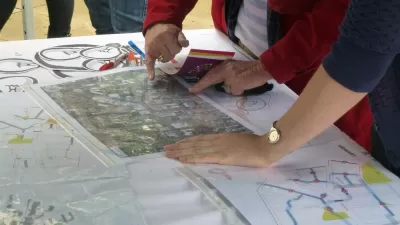A bit of a redefining moment is happening among European planners as they look for ways to address the growing complexity of their communities and the world.
"Call it post-planning, planning 2.0, or maybe un-planning. And the crazy thing is, this revolt against traditional approaches to planning is being conducted by planners themselves," writes Anthony Flint to introduce a recent article about the "identity crisis" in contemporary planning.
Flint's discussion of the evolution of planning follows his attendance of the annual Association of European Schools of Planning conference, where "there was no little soul-searching about the practice of the craft." Rather, Flint writes, planners there were wondering whether, "despite the grand efforts, planning wasn’t really paying off."
As for why: "Global urbanization carries multiple complexities, with loads of unintended consequences and unanticipated outcomes, whether in Cleveland or London or Bogota. If the future is not linear, planning in a linear fashion is the equivalent of banging one’s head against the drafting table."
The article focuses on the exchange of ideas between European planning and American planning, which, already complicated by American political concerns about socialism and Agenda 21 fear mongering, could now be further complicated by European rejection of Smart Growth and other ideas exported by continental planers. According to Flint, "smart growth, whether urban growth boundaries or compact transit-oriented development, is essentially European. And now the Europeans are saying the command-and-control approach doesn’t work so well. European nations are actually adopting more of an American stance—a decentralized agenda, pushing down remaining responsibilities to local jurisdictions, and counting on local planners to engage the citizenry much more."
The article goes on to describe a future for planning, advocated by attendees at the event, that will allow for complexity and evolution in a more complex and connected world.
FULL STORY: Is Urban Planning Having an Identity Crisis?

Rethinking Redlining
For decades we have blamed 100-year-old maps for the patterns of spatial racial inequity that persist in American cities today. An esteemed researcher says: we’ve got it all wrong.

Planetizen Federal Action Tracker
A weekly monitor of how Trump’s orders and actions are impacting planners and planning in America.

California High-Speed Rail's Plan to Right Itself
The railroad's new CEO thinks he can get the project back on track. The stars will need to align this summer.

Why a Failed ‘Smart City’ Is Still Relevant
A Google-backed proposal to turn an underused section of Toronto waterfront into a tech hub holds relevant lessons about privacy and data.

When Sears Pioneered Modular Housing
Kit homes sold in catalogs like Sears and Montgomery Ward made homeownership affordable for midcentury Americans.

Starting in 2026, You Can Charge Your EV at Waffle House
The 24-hour chain infamous for brawls and, to a lesser extent, waffles plans to install fast-chargers at many of its locations.
Urban Design for Planners 1: Software Tools
This six-course series explores essential urban design concepts using open source software and equips planners with the tools they need to participate fully in the urban design process.
Planning for Universal Design
Learn the tools for implementing Universal Design in planning regulations.
City of Camden Redevelopment Agency
City of Astoria
Transportation Research & Education Center (TREC) at Portland State University
Regional Transportation Commission of Southern Nevada
Toledo-Lucas County Plan Commissions





























